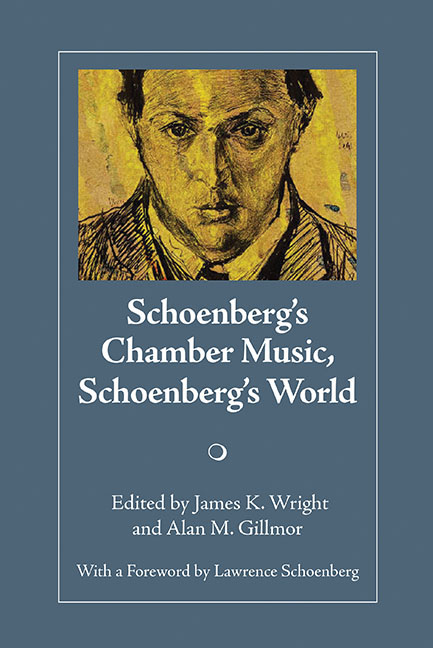Book contents
- Frontmatter
- Contents
- Foreword
- Preface
- HISTORICAL PERSPECTIVES
- The Young Arnold Schoenberg
- Schoenberg's String Quartet No. 1 in Dresden (1907): Programming the Unprogrammable, Performing the Unperformable
- A Bridge to a New Life: Waltzes in Schoenberg's Chamber Music
- The “Popular Effect” in Schoenberg's Serenade, Op. 24
- ANALYTICAL PERSPECTIVES
- OTTAWA SYMPOSIUM AND CHAMBER MUSIC FESTIVAL PHOTOS
- PERFORMANCE, RECEPTION, AND INTERNATIONAL INFLUENCE
Schoenberg's String Quartet No. 1 in Dresden (1907): Programming the Unprogrammable, Performing the Unperformable
from HISTORICAL PERSPECTIVES
- Frontmatter
- Contents
- Foreword
- Preface
- HISTORICAL PERSPECTIVES
- The Young Arnold Schoenberg
- Schoenberg's String Quartet No. 1 in Dresden (1907): Programming the Unprogrammable, Performing the Unperformable
- A Bridge to a New Life: Waltzes in Schoenberg's Chamber Music
- The “Popular Effect” in Schoenberg's Serenade, Op. 24
- ANALYTICAL PERSPECTIVES
- OTTAWA SYMPOSIUM AND CHAMBER MUSIC FESTIVAL PHOTOS
- PERFORMANCE, RECEPTION, AND INTERNATIONAL INFLUENCE
Summary
The performances of Arnold Schoenberg's Verein für musikalische Privataufführungen (1918 to 1921) have received attention in scholarly biographies and studies devoted to Schoenberg, not least as a performance organization devoted to modern musical works under the direction of a leading modernist composer. We are most likely also familiar with his participation in the Vienna-based new music societies the Wiener Tonkünstlerverein (1879-1912), the Ansorge-Verein (1903-10), and the Vereinigung schaffender Tonkünstler (1904-05), the last an association that he founded with Alexander Zemlinsky. However, during the first decade of the century, Schoenberg also associated himself with a broadly based, well known, and longstanding performance society for new music, the Allgemeine Deutsche Musikverein.
Founded in 1861 by Franz Liszt and his New-German colleagues, the ADMV took as its mandate the cultivation of music by living “greater German” composers, staging the premieres of such important works as the oratorio Die Legende von der heiligen Elisabeth by Liszt and the Sixth Symphony of Mahler. Its annual festivals occasionally featured larger “consecrated” works by German composers of the past, especially Bach, to serve as validation for its activities on behalf of the younger generation. Unlike Schoenberg's various Musikvereine in Vienna, the ADMV had no one city as its locus, but rather met each year in a different German city, including locations in Austria, Switzerland, and East Prussia.
Since 1901, the Society had experienced an upswing through the presidency of Richard Strauss, who through the ADMV promoted the cause of such “new” German composers as Richard Strauss, Max Reger, and Arnold Schoenberg. As is well known, Strauss assisted Schoenberg in receiving a teaching appointment in Berlin in 1902. A decade later, they were to trade barbs, with Strauss famously and injudiciously writing to Alma Mahler in 1913 that “the only person who can help poor Schoenberg now is a psychiatrist,” to which Schoenberg responded in 1914, “he is no longer of the slightest artistic interest to me, and whatever I may once have learnt from him, I am thankful to say I misunderstood.” However, in the intervening years, Strauss personally interceded on behalf of Schoenberg with the ADMV's relatively conservative Board of Directors (under Max Schillings's vice-presidency), so that the younger composer received not insignificant financial support and a performance outside of Vienna at a crucial time in his career.
- Type
- Chapter
- Information
- Schoenberg's Chamber Music, Schoenberg's World , pp. 13 - 24Publisher: Boydell & BrewerPrint publication year: 2009



